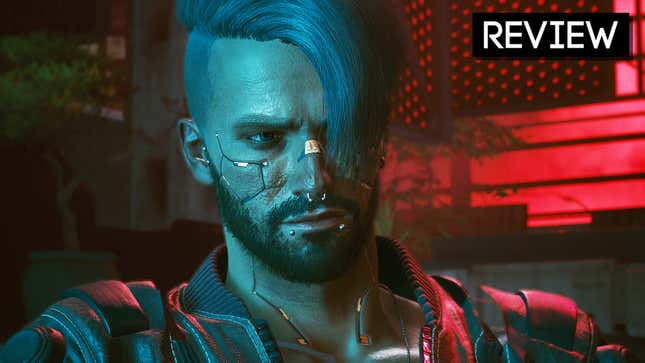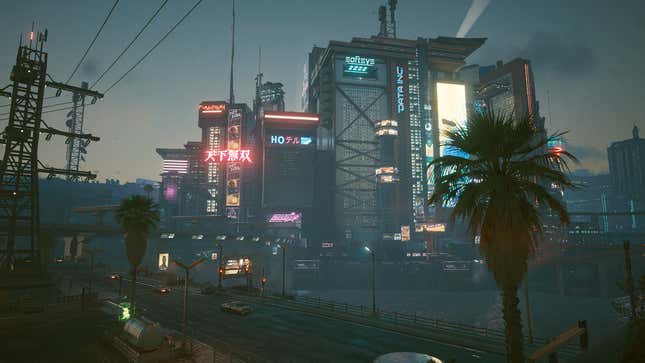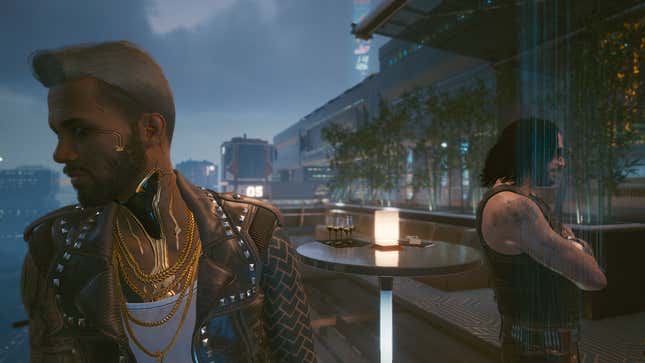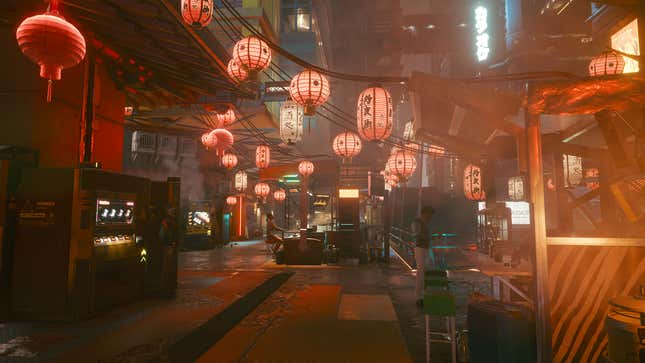
It’s been two weeks since Cyberpunk 2077 officially released. In my initial impressions, I wrote that I was ready for everyone—developer CD Projekt Red, the studio’s PR people, fans—to stop talking about the game and just let me play it. I’ve been playing steadily since before launch, but weeks later, it feels like there’s barely room in the conversation to talk about the game itself.
Of course, talking about what’s inside Cyberpunk is hard if you can’t stomach its content, can’t play it for your physical health, or can’t make it work on your console. After a long cycle of pre-release hype, social media missteps, and crunch, Cyberpunk freefell out of the gate by giving one journalist a seizure. Its post-release life has been about the game’s poor performance on consoles, so rife with bugs and crashes that CDPR offered refunds. This declaration basically amounted to the studio simply saying players could refund it, leading to console-makers and retail stores taking matters into their own hands. In addition to offering refunds, Sony took the extreme step of removing the game from the PlayStation store altogether. Many people who could actually run the game were disappointed by its lack of promised features and how little it resembled what CDPR had spent years promoting. Meetings between CDPR management and investors and management and staff suggest a mishandled project, a host of unrealistic expectations, and something between willful ignorance and intentional deception to hide the game’s abysmal state.
Meanwhile, the conversation about the game went just as disastrously as the game’s launch. Some fans bombarded reviewers with hate and harassment for giving the game low scores or for pointing out it gave them a seizure, then changed their tune post-release to bombard reviewers with hate and harassment for scoring it too high. Some fans, and even critics, felt the press were complicit with CDPR in hiding the game’s poor performance. (From what I could see, the hiding was very much done by the publisher. CDPR only offered the better-performing PC version for review, and restricted when reviewers could show their own video; while the lack of console code certainly made us at Kotaku wonder what was up, no reviewer that I know of had any special insight into the console version, nor did CDPR seem to impose any restrictions that would prevent a reviewer from giving their honest assessment of the game or talking about its bugs.)
Despite all of this, I kept playing Cyberpunk after I published my impressions. I’ve got over 60 hours in it now; I keep drifting back to it, alongside those players still doggedly posting gameplay memes on Reddit and all those hardworking guides and tips writers trying to treat Cyberpunk like any other video game. I’ve got a long list of stories I’d like to write about it: neat sidequests I’ve done, interesting things that have happened to me, thoughts on how the game thinks about issues I care about, such as the environment and food. But it’s always felt tone deaf to talk about Cyberpunk with so much controversy swirling around it, and with so many players unable to play it at all. Every time I think “I’d like to write about Cyberpunk today,” the monkey’s paw curls into some new, terrible contortion.
(This review contains mild spoilers for how Cyberpunk’s ending works.)

Here’s a pretty telling snapshot of what playing Cyberpunk has been like for me. Last weekend, I did a sidequest about autonomous cars. I made my way through a malfunctioning (purposefully, as intended by the game code) autonomous car factory. I hacked into computers to read emails about the company’s human workers losing their jobs, enjoying the rich worldbuilding Cyberpunk largely consigns to its margins. I short-circuited enemy robots with my cyberware hacks, a repetitive but satisfying way around obstacles. As I progressed, it became apparent that I would have a choice to make at the end of this quest, one made complicated by what I’d learned about the cars during an earlier storyline. It was a well-written quest with an interesting choice at its core, and I was both eager and anxious to get to its end. But I had another obstacle to navigate besides the enemy drones and my own conscience: The doors on one side of the factory were glitched (unintentionally, a problem with the game code), and instead of leading to hallways they led to the gaping chasm of the underside of the map. I couldn’t pass through them without falling to my death. I was able to work around it until the end of the quest, when I found myself one attribute point shy of being able to select the choice I wanted to. I considered leaving the area, leveling up, and coming back, but the unintentionally broken doors made me doubt I could. I picked a less savory choice. Keanu Reeves called me “a real piece of shit.” I got a vehicle for my trouble, drove it politely out of the factory, and have yet to drive it again because of how badly it handles. I read a guide that says the different outcomes aren’t all that different anyway.
On my PC, beefed up specifically for the game, Cyberpunk performs OK. I can work around the technical failings and laugh at or even admire the bugs. It’s only crashed once, hilariously, when another car hit me so hard the whole game mysteriously shut down. So I’m not playing the broken mess we’re all talking about. Instead, I’m playing a game whose various pieces don’t fit together, where busyness and choices feel like illusions to cover up its emptiness, where key features like driving and gunplay are a chore. I leave each play session a little befuddled and dissatisfied, but then I read about a quest or see a video of an unfamiliar area and boot the game up again. I can’t quite say if I like it, even though saying things like that is part of my job. I’m still playing it, but I’m not always sure why.
In my impressions, I reviewed each piece of the game separately, evaluating its plot, gameplay, systems, and world on their own. After getting through the main plot and several of the game’s possible endings, Cyberpunk still feels like a bunch of separate pieces that, as one of my colleagues framed it, feel held together through sheer force of will. Some pieces shine: Night City might be mostly a facade of vanishing non-player-characters, empty storefronts, and senseless traffic patterns, but it’s thoughtfully crafted and enticing to explore. Much of my time in the game has been spent just driving for miles, admiring how naturally a busy commercial hub becomes an imposing corporate center becomes a run-down residential neighborhood becomes abandoned outskirts. I can’t get enough of the TV shows, books, and ads; I recently spent 10 minutes watching a talk show on a television in a random food stall, where a therapist and the blue-haired host argued about the causes of cyberpsychosis. A sidequest contained a snippet of fan fiction about Johnny Silverhand’s band Samurai that I actually squealed in delight over. All the background information paints a richer, more intentional world than you encounter just by playing the game. While this bothered me when I first started playing, I love it now. It feels like secrets stashed away for me to find, the detailed world the game’s marketing promised showing up only when I make the time to look.
I also, despite myself, grew to love Keanu Reeves as Johnny. The plot’s “point of no return”—the moment at which you’re shuttled to the end—came sooner than I expected, after a bunch of main story quests that were exciting but never deep enough to really grab me. Your ending options change based on relationships you forge and choices you make, leading to a few branching scenarios and epilogues, after which you’re dropped back into the game right before the final mission, which you can replay if you want. The whole game is technically about what to do about sharing your brain with the digital ghost of Johnny, but I only started appreciating him after the epilogues I saw changed our relationship. In the post-game, where he’s no longer a narrative ticking clock, I’ve come to enjoy his company. I like when he shows up physically, unlike the host of other characters who never stop calling me on the phone. His hamfisted anti-corporate talk and dreaming of his glory days as a rebel rocker felt pretentious for a long time, but now I just think fondly, “Whatever, old man.” He’s more sad than he is cool, but what we’ve gone through together gives him depth. I’ve gotten a few items related to him through sidequests, and I keep wearing them even though I’ve found better gear. I can even bring myself to sometimes drive his car.
Other parts of Cyberpunk work on their own but not within the game. Now that I’m through the plot, the upgrades and perks that once intimidated me feel like the systems of a much longer game, one that would require you to prepare for a dramatic final showdown or give you bigger late-game challenges. I’ve maxed out my street cred, but I don’t need the better weapons the stat unlocks. The high-level guns I have do a lot of damage, but I don’t think upgrading them further will make fights less basic or less time- and bullet-consuming. The perks at the far ends of the skill trees sound cool, but I’m pursuing them more out of curiosity than a real sense of need. There’s no reason to put points into stats that give me different quest options if most of the quests end up the same. My expensive double-jumping cyberlegs haven’t unlocked any worthwhile new areas. The weapons, character enhancements, and leveling system are all good on their own, but they feel like they would be better used in a game with a longer story, more nuanced combat, or a different difficulty curve.
Other parts of the game just don’t work at all. Cyberpunk never departs from its crass sexualization or un-nuanced views of race; as cool as its world can be, it’s always a little off-putting. For all protagonist V is meant to be a criminal trying to make his way in Night City, he can side with corporations and cops as easily as gangs and fixers, making whatever anti-establishment sentiments the game professes to explore feel hollow. The complex character creator is mostly for show. My nomad background never came into play in a meaningful way. Even the different endings seem less like naturally-occurring results and more like hitting the right boxes on a checklist. There are several boss battles that I found tedious, against characters I didn’t care about whose only interesting moves were that they could heal themselves. I’ve mostly just crafted ammo, since the game’s enemies require so much of it. None of the rest of the crafting has felt necessary; it also seems like, until recently, too much crafting could break your saves.

I don’t know the story of Cyberpunk’s development, but when I play I catch hints of what feels like frustrated intentions everywhere. There are so many places where the game feels like it was meant to be something else: areas meant to have content, choices that could have mattered, features that could have been more necessary.
Besides not meeting my hopes of how it could have been great, the game also doesn’t diverge from my fears about how it’d fall short. Its worst parts are exactly what some of its pre-release talking points suggested they’d be: regressive about race and gender despite so many opportunities to correct course, a cyberpunk veneer that’s made its most substantial point in how the game itself demonstrates how corporations like the one that made it behave. It’s hard to play this game without constantly wondering: Why is it like this? What happened during these past eight years?
I assume CDPR will keep releasing patches to fix some of the game’s problems, making Cyberpunk run on last-gen consoles and letting more players actually play. I don’t know whether the developers will fix its other problems, overhauling the combat, customization, AI, driving, wanted system, and all the other parts many players are disappointed in.

I’m torn. I want to play the game that it seems like the hundreds of people who worked so hard on it intended to make. I want them to turn Cyberpunk’s disastrous launch into something they can be proud of. But I’d also feel OK if the studio’s management learned some lessons from the whole thing, gave the developers a well-deserved break, and tried to do better with a new project. I don’t know if the conversation around the game will be some kind of breaking point, or just the latest triple-A game controversy we all yell about until another one shows up.
My favorite ending in Cyberpunk is the one a lot of players call the “bad” ending. I wouldn’t have been satisfied if it were my only choice, but its sad but uncompromising tone felt right for my playthrough. In every ending, characters you forged relationships with message you during the credits. In this ending, they have different opinions on your choice, and some wish things came out differently. This ending felt most like my time inside Cyberpunk and in the discussion around it: a lot of conflicting emotions and no definitive answer.